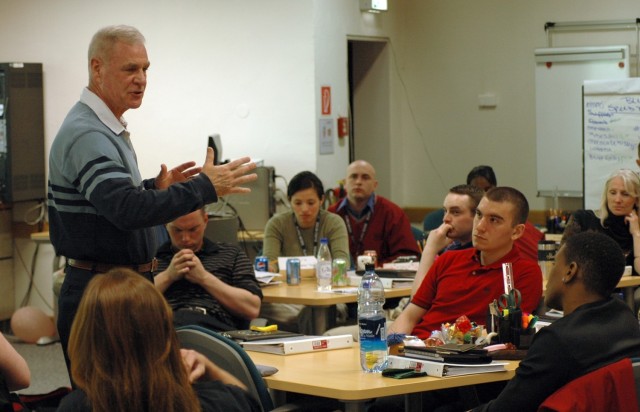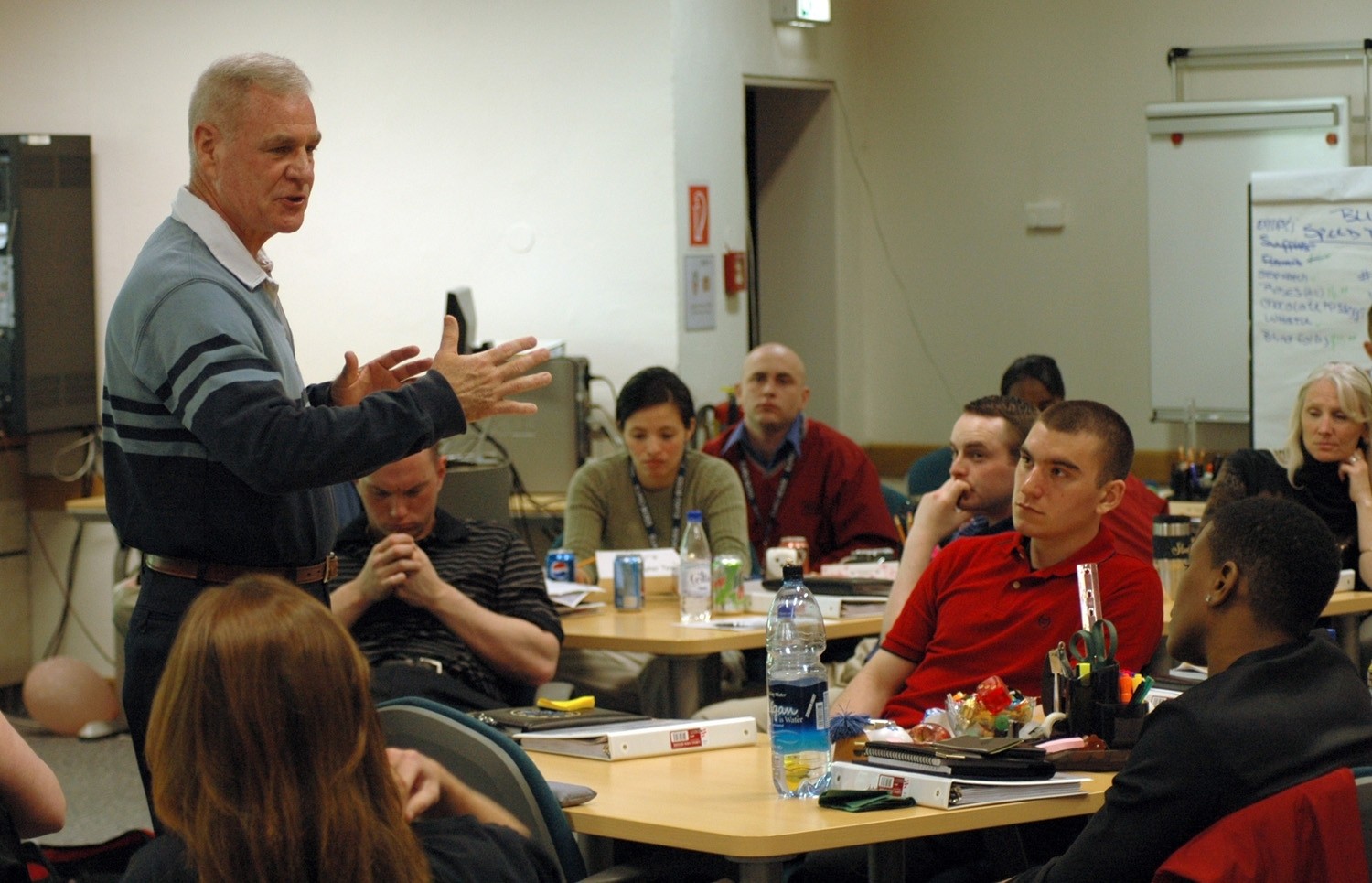SCHWETZINGEN, Germany - The Better Opportunities for Single Soldiers program "is the collective voice of the single Soldier" which represents 49 percent of the Army.
More than 46 participants from Department of the Army, Installation Management Command, units and garrisons around Europe shared ideas about how to support those troops during a BOSS training course April 17 - May 2 in Schwetzingen.
The weeklong forum witnessed junior enlisted Soldiers learning - and teaching - effective meeting plans, budgeting, cash and petty cash controls, procurement, hosting live entertainment, MWR marketing, event advertising and commercial sponsorship - while having some fun.
Arnie Cole, director of Family and MWR for IMCOM-Europe is in charge of an increase in MWR facility funding which he credited to the Army Family Covenant, and includes BOSS.
"The single Soldier's voice is important. I'm going to listen and build facilities that meet their needs," Cole said. "They are just as important as families, civilian employees, retirees and reserves. We are responsible for all of them."
Cole added he is spending a lot of time specifically ensuring that Soldiers in locations identified for closure maintain a high standard of service.
"Having forums like this helps us make better decisions," he said. "When we start distributing resources, we had better know what they want."
Since its inception in 1989, BOSS has been known by most for organizing recreational activities for new Soldiers. But the program has three core components, and three support structures to make the program work.
The first and perhaps most important component is raising well-being issues, said Sgt. 1st Class Toprane Coatney, Department of the Army BOSS representative.
"BOSS is the collective voice of the single Soldier. It is a megaphone to the leadership on quality-of-life issues," he said. "Those things that need command attention, such as differences in educational opportunities or cost-of-living allowances - to put us on the same individual benefit level as married Soldiers."
Coatney added that single parents, geographical bachelors and bachelorettes are part of the BOSS program's audience, mostly junior Soldiers and officers 18 to 25 years of age.
Another BOSS component is community service. BOSS Europe groups, Coatney said, have been very effective in taking this to heart. The Kaiserslautern group, which changed their last name to "service members," reflecting the inclusion of Air Force personnel, has adopted a highway in their local area, a visible way of strengthening the bonds between Americans and their host nation.
The third component is recreational activities. The current operational tempo leaves all Soldiers with less time to explore the rich opportunities available to them. Working with the morale, welfare and recreational advisors, another dedicated program support, BOSS representatives generate their own activities based on what their people want.
"We get them out there (in Europe) at a cost they can afford," said Spc. Gene Brown, Europe Region BOSS representative. He recalled learning to snowboard in Austria over New Year's weekend on a trip he organized. "Those memories are ones that you remember for a long time. It took everyone's mind off of work."
Spc. Jonathan Maki, GrafenwAfAPhr garrison representative and forum briefer, said it's all about what the Soldier wants. "BOSS has no limits. MWR supports my program 100 percent, and the command, especially the garrison sergeant major, are huge supporters of the program."
Among his future plans is a three-day skydiving event, which will have other activities nearby for those with more earthbound singles. "It's our job to gear the program towards the target audience."
The result of this effort is more effective warriors, Coatney said.
"A happy Soldier is a better fighting Soldier," Coatney said. "New people need to know that we are here for them. We are focused on increasing morale, sustaining readiness and helping with retention."
The forum provided ideas and motivation for Airman 1st Class Justin D. Alexander, who joined the Camp Darby, Italy, BOSS program a year ago and became its vice president just three weeks before attending the forum in Schwetzingen.
"A year ago, there was nothing to do," he said. "Now we have four different trips planned."
"This has been amazing. I had no idea what was going on," he said laughing, "and getting everyone was a challenge. Now I have a bunch of ideas for when I get back - and know who can help us get things done."
BOSS can benefit commanders, according to Coatney.
"It is a tool used to gauge morale and get the message out; we augment the chain of command," said Coatney. "You can even see it at my level, where the Army leadership has given us more funding and support."
For the Soldier, Coatney explained that BOSS provides career-enhancing opportunities and skills. "It can make you a better Soldier," he said. "Take a private first class. If they become a BOSS rep for their unit, they end up briefing committees, talking to senior leadership, and getting a broader picture of the Army."
Maki briefed the forum attendees on effective techniques for bringing issues to the attention of their chain of command. "Senior leaders don't have time for BS," he said. "Don't go into a meeting with am empty gun. When you lay it out for them, things can happen just like that."
The forum helped attendees become better leaders by teaching higher-level organizational skills.
Joanne Geer, IMCOM-Europe MWR BOSS advisor, started the forum after discovering Soldiers needed training on budgeting, organization and "all the other things necessary to make things happen."
MWR advisors act as continuity and help ensure things are done right. "We need to train them just like we train them to heal other Soldiers or fix equipment. It's all about their well-being."
Creativity was a major theme of the forum. Darryl Ahlara and Ken Freehill, contractors with Command Promotions International, worked with the Soldiers to develop what they call "audience participatory interactive comedy-mystery events."
That mouthful of words "feels like a play, walks and talks like a play, but is really a living logic puzzle," Freehill said. "We are trying to inspire them to do clever things that people will want to do."
The duo taught staging and theater presence and guided the group through the preparation of scenes throughout the week. The reward for this work came at the going away dinner, where an interactive mystery used the scenes created by the Soldiers themselves.
"The tools they learn here," Freehill said, "will give them more self-awareness and confidence, all the things like eye-contact, not pacing the floor, this will allow them to build effective presentations to take to their senior leaders."


Social Sharing